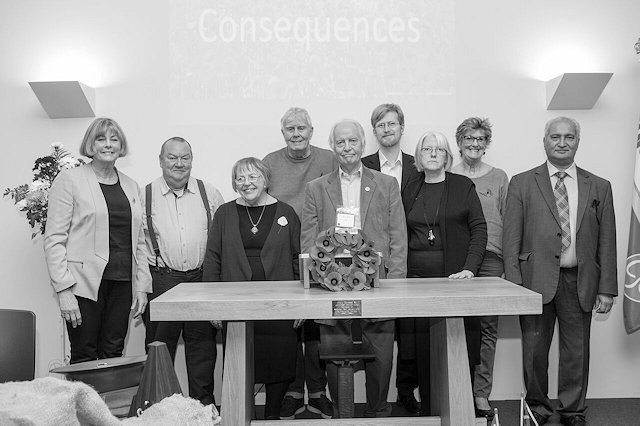The Armistice was signed; Peace was celebrated but what happened next?
Date published: 27 November 2018

Conflicts and Consequences was the recent dramatisation produced by Rochdale Borough Multi-Faith Partnership
It has been an incredible period of national commemoration of one hundred years since the end of The Great War.
The previously poorly acknowledged part played by people from different nationalities from across, what was then, the British Empire, is now much more widely understood and recognised.
After four long years, the fighting finally came to an end. The world began to try to rebuild and most importantly to find a way to grieve for the immense loss of life and to attempt to find ways to try to live with the lasting physical and emotional trauma.
The peace which came following the ceasefire was, however, an interlude. In a little over twenty years time the world was at war once again. World War II was a direct consequence of the conflicts of World War I, as was, indirectly, the later ‘Cold War’ with the Soviet Union.
A dramatisation called 'Conflicts and Consequences' was produced by Rochdale Borough Multi-Faith Partnership to mark both the centenary of the Armistice and Interfaith Week. In partnership with talented local poets and performers, the event, which was held at Saint Andrew’s United Reform Church, Rochdale, took the audience on a journey which began with the circumstances and international relationships which led to the outbreak of a global war.
Using modern and contemporary poetry, narrative and songs from the times, the audience were introduced to key people along the route. These included Kaiser Wilhelm II of Germany, who had grown up coping with a physical disability at a time when this would have been seen as a point of embarrassment and shame.
The narrative took a perspective which made reference to the parts played by people of other faiths, including Muslims in the trenches. It also demonstrated the humanity on both sides of the trenches by relating the incidence of the spontaneous Christmas truce of 1914 when German, French and British soldiers exchanged little gifts, played football and even took photos of each other.
The Great War and its aftermath had a lasting and powerful impact on a German soldier who was, a few years later, to rule Germany with an iron fist. Adolf Hitler channelled his seething resentment from the Great War and following the Nazi invasion of France in 1940, he took the original Armistice Coach from 1918 and in the very same forest clearing, humiliated France into capitulating into signing an armistice which turned the tables back.
Hitler and the Nazis would also direct their wrath towards the Jewish population, amongst others, culminating in the mass exterminations in the death camps of the Holocaust. A precursor of this would be Kristallnacht, the terrifying night of broken glass which took place exactly twenty years after the 1918 Armistice. Jewish homes, schools, businesses, and synagogues were attacked and burned, many died and many were rounded up and taken to concentration camps.
Taking part in Conflict and Consequences, were members of Pulling Threads, the performing arm of Touchstones Creative Writing Group. Over the past four years Pulling Threads have been delivering original poetry and drama to mark particular events and battles of the First World War and to portray, a hundred years on, the cruel reality of the time.
Members of the Carer’s Choir added the flavour of the patriotism of the young men and boys going off to fight a war which was aimed to be 'over by Christmas'. They also gave a rendition of Silent Night which was a counterpoint to it being sung in its original language of German by soloist and reader Carlo Schröder.
The journey through time was led by narrators Robin Parker of the Multi-Faith Partnership and Eileen Earnshaw of Pulling Threads.
Do you have a story for us?
Let us know by emailing news@rochdaleonline.co.uk
All contact will be treated in confidence.
Most Viewed News Stories
- 1The plan for two new apartment blocks with an unusual car parking system
- 2Andy Burnham responds to harrowing reports from hospital nurses
- 3Police seize £48,000 in Rochdale property search
- 4The museum undergoing £8.5m transformation now needs a new roof
- 5Residents urged to be vigilant after spike in Shawclough burglaries
To contact the Rochdale Online news desk, email news@rochdaleonline.co.uk or visit our news submission page.
To get the latest news on your desktop or mobile, follow Rochdale Online on Twitter and Facebook.

